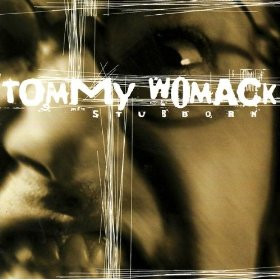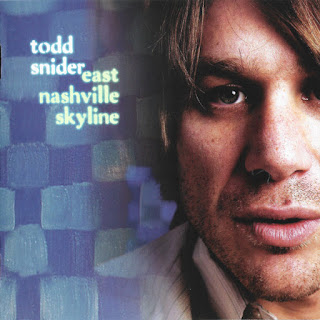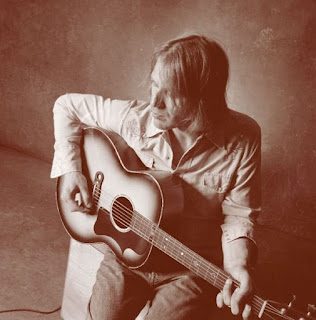Todd Snider is one of Nashville’s best-kept secrets, our very own “cult artist” who may be too eccentric, too honest, and too talented to break through to a fickle mainstream weaned on boy bands, American “idols” and Music Row schlock. Snider is too often categorized as a “novelty” act because he infuses his folkish story-songs with humor and wit, reducing funny-cause-they-could-be-true songs like “Beer Run” or the satirical “Talking Seattle Grunge Rock Blues” to comedic status without recognizing the skill it took to weave these tales. The same critics cavalierly dismiss Snider’s more serious efforts without listening to the tears and pain behind such well-crafted tunes as “You Think You Know Somebody” or “Crooked Piece of Time.”
Todd Snider’s East Nashville Skyline
Considering Snider’s entire oeuvre (and I have heard it all), it’s time, perhaps, for a bit of rock critic heresy: Snider is this generation’s Dylan. Snider’s rootsy blend of rock, folk, blues, and country echoes that of rock’s greatest scribe. If Todd’s lyrics fall short of the weighty measure of “Spanish Boots of War” or “Blowin’ In the Wind,” well, those songs have been written. The Viet Nam War and the ‘60s are history (although Iraq may sadly provide inspiration for anti-war songs for years to come) and two generations have passed since Dylan spawned hordes of imitators. The “grunge” generation’s spokesman has attitude, wit and humor to go alongside the pathos and insight, Snider drawing inspiration from other such troubled wordsmiths as Billy Joe Shaver and Kris Kristofferson much as they did from Dylan.
It’s been ten years since the release of Snider’s excellent debut, Songs For the Daily Planet, which spawned a minor hit with the album’s hidden track, “Talkin’ Seattle Grunge Rock Blues.” During that time, Snider has suffered from problems with drugs and alcohol, spent a night or two in jail, and played hundreds of live shows. He’s suffered the deaths of friends and the whims of a (major) label’s attempts to turn him into a rocking, Paul Westerberg-styled singer-songwriter. It’s really after signing with John Prine’s Oh Boy Records that Snider has blossomed as an artist and performer. Even with an enthusiastic support system behind his work, personal demons have continued to plague Snider, landing him in rehab and struggling to overcome his addictions. East Nashville Skyline, Snider’s sixth studio album, reflects these trials and tribulations. It represents Snider’s finest musical effort yet and represents an exciting new chapter in the artist’s life.
As such “Age Like Wine” is an appropriate opening song for this new chapter. Snider pays homage to Billy Joe Shaver’s “old timer, five-and-dimer” while admitting to himself that “it’s too late to die young now.” It’s a reflective piece, the 37-year-old Snider now trying to “age like wine,” stating that “I thought I’d be dead by now,” perhaps sadly concluding “but I’m not.” The following tale of mistaken arrest is biographical, “Tillamook County Jail” recounting an unwanted stay at one of Oregon’s finest institutions. “Play A Train Song” is one of Snider’s best compositions, a tribute to a fallen friend, the kind of rowdy, charming East Nashville born-and-bred scoundrel that you’d have to have known at some time in your life to truly understand. The minimalist “Sunshine” is about suicide and redemption while “Incarcerated” is a Memphis-styled rocker that evokes Jerry Lee in a story of somebody done somebody wrong.
The Ballad of the Kingsmen
Sometimes Snider’s best performances are with some other artist’s songs, such as Fred Eaglesmith’s haunting “Alcohol And Pills.” With guitarist Will Kimbrough’s relentless fretwork behind Snider’s mournful vocals, this tribute to music’s fallen heroes – from Hank and Elvis to Gram Parsons, Jimi and Janis – hits too close to home for Snider, who has barely escaped a similar fate. Eagelsmith’s chorus, “you’d think they might have been happy/with the glory and the fame/but fame don’t take away the pain/it just pays the bills/and you wind up on alcohol and pills” sums up rock music’s tragedies as well as could be done. A cover of Shaver’s “Good News Blues” is a rowdy, bluesy raver that, as Snider writes in his liner notes, should make Shaver “dozens of dollars” in royalties; the song’s true worth is as a tribute to one of country music’s overlooked songwriting geniuses.
Snider’s “The Ballad of the Kingsmen” is a gem. It starts out with the story of “Louie, Louie” and evolves into an inspired rant on the religious right, Conservative politicians, Marilyn Manson and the doubtful effects of rock music and pop culture on young adults when war is broadcast on TV nightly. A hippie at heart, Snider’s hilariously satirical “Conservative, Christian, Right-Wing Republican, Straight, White, American Males” puts the artist directly at odds with the mainstream zeitgeist and our current, unelected leadership. While Snider pokes fun at both sides of the political equation, he admits that he is “so liberal, I have love for conservatives.”
The most telling moments on
East Nashville Skyline come near the end. “Nashville” is a love song, of sorts, to Snider’s adopted hometown, the “Nashville you don’t hear on the radio” as he says in the liner notes. After wandering the country, from Oregon to California to Texas to Tennessee, Snider landed on the other side of the Cumberland River in historic and often troubled East Nashville. Perhaps his wandering days have come to an end, Snider singing that “there ain’t nothing wrong with Nashville, nothing wrong with picking country songs down in Nashville, Tennessee.” Snider’s reading of the pop classic “Enjoy Yourself” closes the album, perhaps an affirmation of Snider’s own struggles, the singer reminding his listeners (and himself) to “enjoy yourself, it’s later than you think.”
The Reverend’s Bottom Line
Assisted by his long-time partner-in-crime, Will Kimbrough (another of Nashville’s criminally overlooked talents), Snider has produced the most solid and enduring album of his career. If fame and fortune haven’t necessarily followed his efforts during the past decade, Snider can take solace in the fact that he nevertheless has a loyal and growing audience.
Thanks to supporters like radio broadcasters Bob and Tom, who regularly feature Snider on their syndicated morning program, Snider also has a national forum for his lively music and a future that can only get better. East Nashville Skyline represents an important new chapter in Snider’s career that, with a little luck and the artist’s talents, will continue another decade and beyond… (Oh Boy Records, released 2004)
Review originally published by Alt.Culture.Guide™ zine













